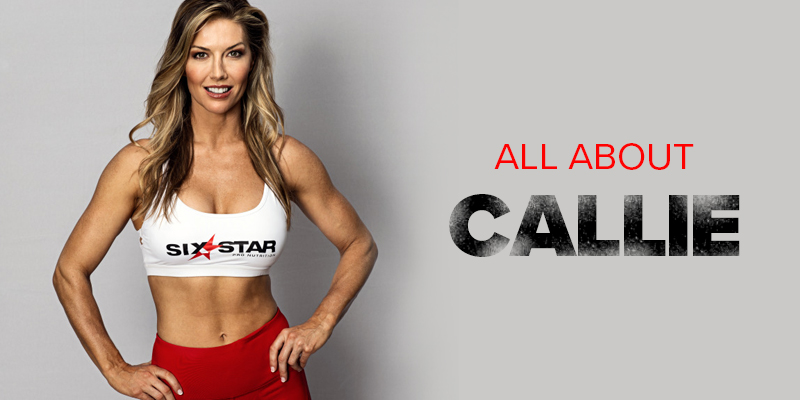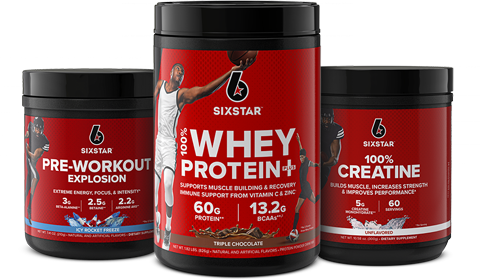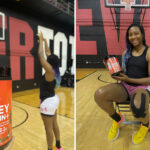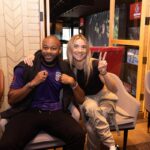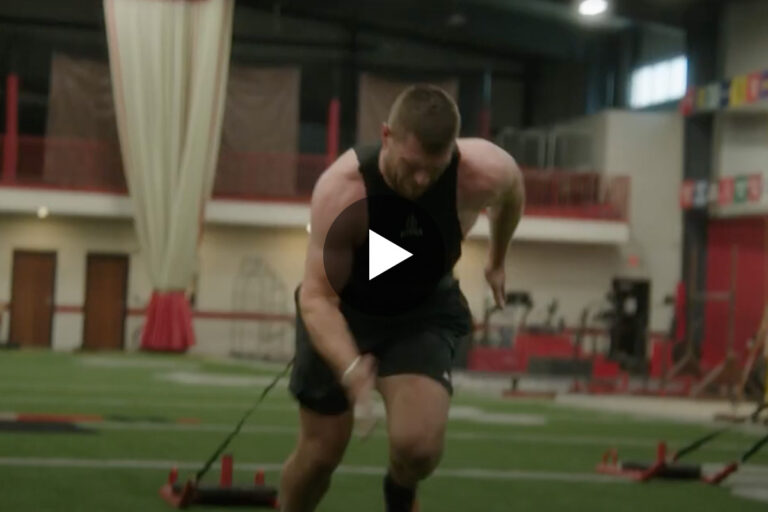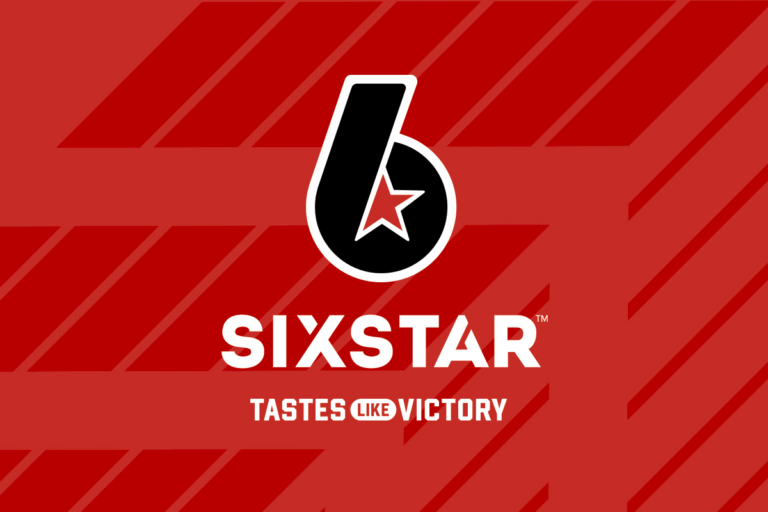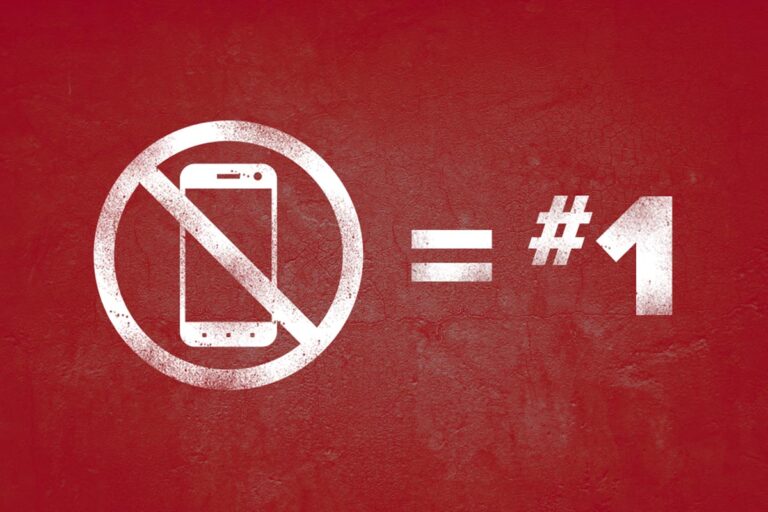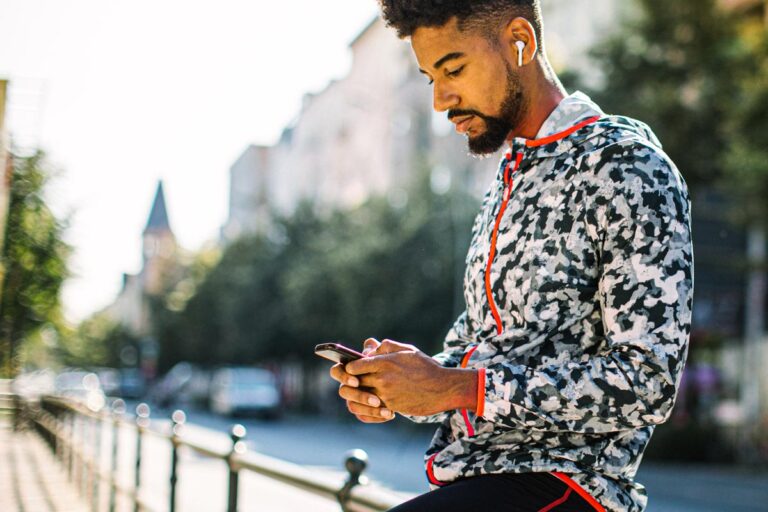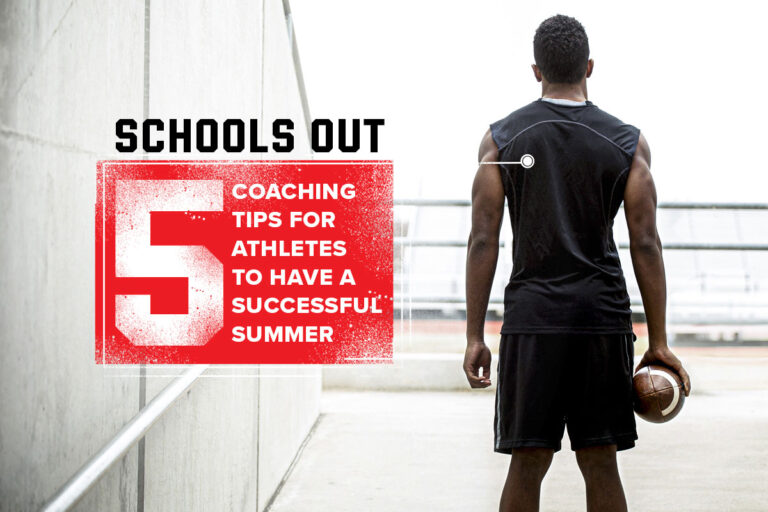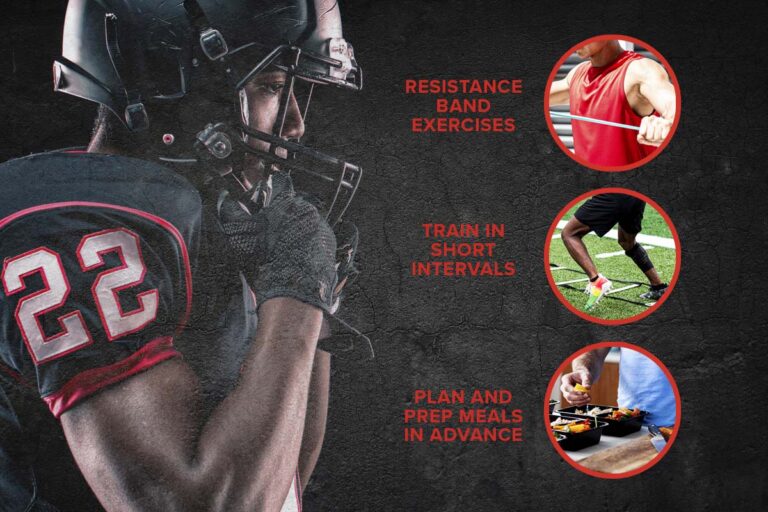Callie Bundy is a proud Six Star Athlete who has competed professionally as an IFBB (International Federation of Bodybuilding and Fitness) Bikini competitor, was a former NCAA Division I Softball player, and a three-sport high school standout playing soccer, basketball, and softball.
The mother, model, and host took time out of her busy schedule to chat with SixStarPro.com about how playing sports taught her how to lose with grace, why #FailHard is one of her new favorite hashtags, and why authenticity is so important to her. Bundy, who likes to refer to herself as a ‘Professional American,’ also talks about how she learned to get comfortable being uncomfortable, what her transition from being a team sport athlete to an individual IFBB Bikini competitor was like, and why having haters on social media may actually mean that you’re on the right track.
Q: You’re someone who grew up playing sports and loved every second of it. You’ve referred to yourself as a ‘tomboy’ and said that you spent most of your life in cleats, sneakers, or a hat. Do you remember what it was about playing sports that you loved so much when you were little?
A: “Yeah, it’s pretty simple. I just liked it. (Laughing) It was that simple. My parents exposed us to all different things and I just liked it and wanted to keep doing it.”
Q: In high school you were a three-sport athlete playing soccer, basketball, and softball. Then you went on to play NCAA Division I Softball in college. What did playing competitive sports at such a high level teach you about yourself?
A: “Sports at any level taught my everything about myself. I literally always tell people that sports made me who I am. One of the biggest lessons it taught me is probably learning how to lose because it’s not easy to lose. Everyone wants to win, and it’s great and it’s fun, but losing is a lot harder.
In high school softball, I was a pretty dominant pitcher and hitter. I specifically remember there’s a photo from after one of our championship conference games and everybody is celebrating because we had won. All the girls are in a triangle, and then I’m standing off to the side kind of pouting. I think I had struck out 21 hitters and went 3-for-4, but I was mad that I didn’t go 4-for-4. I remember my dad showing me that photo and being like, ‘Do you see what a jerk you look like?’ (Laughing) It was so visual and glaring and right in front of me. I was like, ‘Oh my God! What a jerk I was.’ So, that totally changed my perspective on everything.
Softball, specifically, probably taught me the most about losing and rejection. I mean, you can get up to bat ten times and get a hit four times and that’s still really good, but you’re failing most of the time. That was a really hard lesson for me to learn and accept. And it obviously got magnified the higher I went – high school softball is very different than Division I where everyone’s great.
I don’t think people realize how often in life this happens. Not everyone just gets that opportunity, or that job, or whatever it is they’re looking to do in life out of the gate. But a lot of people stop after that first No, that first rejection, that first bump in the road, or that first family member telling them, ‘Hey, I don’t think this is a good idea,’ or whatever it is. But I have this mentality from playing sports where I’m like, ‘Hey, I’ve only gotten ten noes? This isn’t that bad. I can turn this around!’ So, the biggest lesson that sports probably taught me was learning how to lose, and how to not let it affect you negatively, but to learn from it and grow from it. Losing will only make you stronger, if you let it.”
Q: It sounds like you’re always striving to be better. Where does your mentality of refusing to give up and refusing to settle come from? And how has it continued to play a role in your life today?
A: “I think that’s something that came from sports, too. People always said that I was coachable, and I could always take criticism. It didn’t bother me because I knew it was just an opportunity to get better. Sometimes it would bother me, depending on who it came from, right? (Laughing) Say, if maybe my dad told me something one too many times, I was like, ‘OK, whatever, Dad!’ But then I would have a coach echo the same sentiment and I’d be like, ‘Damn it. They’re right!’ Even if I didn’t want to hear it, I always heard it somewhere in there. I’m very self-aware. So, I know it’s only going to help me.
In life, that mentality has been massive, especially since everything changes and evolves so quickly now. That mentality allows me to keep evolving and keep changing. It’s funny, I’ll get a new job, or do something different, and I’ll get it back and I’ll tell my agent, ‘I could’ve done this better.’ And they’re like, ‘You’re so hard on yourself.’ And I’ll say, ‘No, I’m not hard on myself. I’m just realistic.’ Like before I even get the product or the video back, I’m already thinking in my head, ‘Oh, I should’ve said this, or I should’ve done that.’ To me, that’s the fun part of it. I like to continue tweaking, taking what works and learning from what doesn’t so that I can see where I can get to.”
Q: After your athletic career, you started competing in the NPC (National Physique Committee) where you were able to earn professional status in the sport as an IFBB (International Federation of Bodybuilding and Fitness) Bikini competitor. So, what was that transition like for you going from being an athlete who played team sports to competing as an IFBB Bikini competitor on your own?
A: “It was awkward on every possible level for different reasons. One was going from a team sport where you actually have control over the score – like I could muscle my way to a goal, hit the ball, or do different things that had an effect on the outcome – to then going to a sport, or ‘activity’ as I called it, that was completely subjective and you’re just being judged. It’s literally just someone’s opinion of you.
I remember one of the first shows I had done decently in. We were doing the overall and it was me and three girls, and the feedback I got after the show from one of the judges was, ‘Well, you didn’t win because her hair was better than yours.’ (Laughing) I can’t even say it with a straight face. And I remember I was like, ‘This is a physique competition, right? So, let me just process this. You’re telling me that my physique was better, which is the main goal. But since her hair was better, overall that made her package better?’ The package being like what you’re presenting onstage. So, I was completely floored on that one.
I remember calling my parents and telling them – and keep in mind it was weird for them too because I was always wearing cleats, a hat, full uniforms, completely covered up, and now I’m in like sparkly bikinis spinning around onstage and they’re like, ‘What are you doing?’ Then I’m telling them stories like this – that I lost because my hair wasn’t good enough. (Laughing) And my dad was like, ‘Well, you know, that’s why I was never a fan of ice skating.’ (Laughing)
Q: So, as someone who grew up playing sports and wearing mostly team uniforms with hats and cleats like you said, were you comfortable competing as an IFBB Bikini competitor right away or did it take some time for you to get used to it?
A: “It was awkward. Awkward all the way around because of that, and then the drastic change in what I was doing physically. It was one thing when I was displaying athleticism, and then another thing when I’m displaying my physique, which is your body. So, it’s all skin.
I remember someone had shown my grandfather a photo of me competing onstage with no backstory, which I wasn’t very happy about. My grandfather was like 89 at the time, and he was a doctor who put himself through medical school. He graduated from Brown in three years and then went on to Tufts University School of Medicine. He spoke six languages, and he had always seen me as this athlete. Then somebody shows him this photo and he said, ‘Callie, what’s going on?’ So, I had to explain to him, ‘Pa, this is just one day of what we do. The rest of it is just like everything else that I’ve done. We train two-a-days, but it’s a physique sport so you’re displaying the changes in your physique.’ Then he started to get a little more comfortable with it. He said, ‘You know, we did have some powerlifters in the family.’
That’s always one of my favorite stories to tell because then he kind of came around, and was always asking about my competitions. He would go to lunch with his friends, and he’d be like, ‘Do you have any new photos I can show them? We always talk about you at lunch.’ And right before he passed, it was like coming full circle because he was asking me for glute tips. He was still working out every morning and he said that his low back was starting to bother him. Being a doctor, he was like, ‘I know my glutes aren’t strong enough so I want to strengthen my glutes. I was wondering if you had glute tips.’ That was when I knew he fully respected it and we were back on the same page.
But, yeah, it was awkward on every level because it was so far from who I was innately. I hated being onstage. It was my least favorite day of the entire thing. I’ve always done two-a-days and I’ve always trained so that wasn’t a big deal. I never actually dieted for – I had dieted as an athlete, but I had never dieted to look a certain way before so that was different. I didn’t love that, but whatever. The day of, being onstage, and you’re kind of acting a little bit – I never took dance, I wasn’t like a stage performer – so it was very unnatural for me, which was part of the reason why I liked it though because it did make me uncomfortable. You don’t get anywhere, or grow, without being uncomfortable. So, it did make me have to grow and expand as a human, which I liked that part of it. It wasn’t something that came easily to me. For most of the girls who I competed with, being onstage was their favorite day – doing the tan, the hair, the makeup, and putting on the suit. I just couldn’t wait for it to be over.”
Q: It sounds like you’re constantly putting yourself in situations that you know you’re going to be uncomfortable in. Why is it that you’re so comfortable being uncomfortable?
A: “I think it’s because I like learning. So, if there’s something new, I’m like, ‘Oh, that’s interesting. I want to try it.’ So, it’s really that simple. It’s like the same thing with competing. I was like, ‘Oh, that’s interesting. Let’s see.’ Once I learned everything I could learn about the training and the dieting, then it was like, ‘OK, now it’s time to move on to the next thing.’”
Q: Some of your football trick shot videos have gone viral leading to you being featured on major sports sites and even national TV. What was your reaction when you first saw the number of views on your viral videos?
A: “Complete shock, honestly. I had no idea that anyone would be that interested in them because it’s not new for me. I’ve been throwing a football since college. So, if I knew that people were going to react that way I would’ve done it a lot sooner. My brother and I even still joke about it. We still don’t really get what’s so interesting because it’s what we grew up doing. It’s not different to us. So, yeah, just complete shock. I really couldn’t believe it.”
Q: Is it your goal to change the way people view female athletes or are you just out there doing your thing?
A: “To me, I’m just being me. Like I literally just do things because I like them. So, if I like them, and they’re interesting, and I want to learn, then I do them. It’s that simple. In today’s day and age, I think people sometimes think that they have to do something for other people, and that’s fine. But I always tell people, athletes who people look up to like Tom Brady, Tiger Woods, or Michael Jordan, those guys didn’t get into their sports because they were trying to prove something to anyone. They were just being the absolute best that they could be, and in doing that that’s when you’re serving yourself, and that’s when you’re serving everyone because then you get the trickle down effect. If you get into something just to try to prove, ‘Oh, I’m doing this to show this,’ it’s inauthentic I think. Tom Brady is doing what he has been doing for 20 elite years literally because it’s just who he is, and that’s what’s so incredible about it. He’s not doing it to prove this or that. So, for me, yeah, I do it because I like it. There doesn’t have to be a big reason for it.”
Q: You’ve said that your passion for sports is what led to your love of fitness. Soon you’ll be launching an app that will feature exercise programs for at-home and the gym, new workouts every month, and nutrition tips. Why is it so important for you to share the information that you’ve learned along the way with others?
A: “Because fitness is hard. I’ve always tried to not be a fitness person, while being a fitness person – if that makes sense. Because fitness people follow other fitness people, right? But I get people from different worlds that follow me for different things, and they may not even be into fitness. They’re like, ‘I follow you because you’re funny,’ or ‘I like that you eat burgers,’ or ‘I like your trick shots,’ or ‘I like your dog.’ It’s for all these different reasons. I’m not just solely a fitness person putting out fitness content.
So, in doing that, I think you can reach more people and make a difference by getting people into fitness without knowing it. To me, people try to outthink the room too when it comes to fitness. They’re like, ‘You’ve gotta eat this. You’ve gotta do two-a-days. You’ve gotta do this.’ And it’s like, ‘No, it’s actually super simple. Eat real food and movement is the best medicine.’ So, if that’s doing trick shots, or walking your dog, or whatever it is, that’s fine. That’s why it’s important for me to share my fitness side of it because I know how important it is to stay well, and how hard it is to stay well.
You know, I have much more respect for people who get into a fitness routine later in life when they have no sports background, and they figure it out on their own. To me, it’s just innate. I like it, and it’s something I’ve always done. You know, if I’m not doing it, it feels weird. Versus someone who at 38 or 45 just starts getting into this routine and is crushing it. I’m way more impressed by them than I am by me. So, I just want to show that it doesn’t have to be hardcore, it doesn’t have to be your whole life, and you don’t have to just eat fish and asparagus all day long.
Ultimately, the bigger picture of it is wellness, and I come from a medical family. Ideally, I don’t want you to have to see my family. So, what you want to do is be well for as long as you can. Fitness, movement, and food are all very big pieces of that, but if you can do that in a fun way, I think you can reach way more people. So, that’s why it’s something that I always try to keep light and fun and share with people.”
Q: On your Instagram account, you have a #YourMom section where you post photos and videos of you and your son, Marco. In one of those stories you posted photos of you when you were either pregnant or had just given birth to Marco. Yet, in almost all of those photos you were still being active and exercising. What advice do you have for other working mothers when it comes to their health and fitness journeys?
A: “Listen to your body. You know, I, of course, have only had one child, but every pregnancy is different. So, you might have one where you feel great. You might have one where you feel terrible, right? No one can decide that for you. For me, I don’t think I worked out once the whole first trimester. I had food aversions, and probably got physically sick at least once a day the whole first trimester. I had no energy. And at that point your body is really called upon to do a lot for the little life you’re growing. So, for me, it wasn’t a matter of, ‘Oh, I’m tired. Just push through this.’ I know the difference. Like, if I’m training for a show, or training for a sport, I’m like, ‘I still gotta get up and go out and do this.’ It’s a completely different ball game when you are growing a life, and that life is dependent on your life in order for it to be healthy and survive. So, you really have to listen to your body.
There are people running marathons until like nine months and everything, and that’s great, and great for them. I remember I tried running at probably like four months and it was just uncomfortable on my belly to run. So, from there on out I just walked. There was no running involved. You have to really just listen to your body. Don’t think that you should push through it. No, no, no, no, no! You are growing a life. That’s your most important job. Some days that means not doing anything, but relaxing and staying hydrated and eating your food.
So, that’s my number one piece of advice, especially since if you go on social media there are so many pregnant moms that are being very active, which can make people feel like they should be doing more. Luckily, for me, I’ve never really cared about what anyone else is doing so I don’t have that, but I know that it affects people. And you’re under enough stress as a mom carrying a life. So, don’t worry about what anyone else is doing. Do what you’re comfortable with and listen to your body. If you feel like working out, great; if you don’t feel like working out, great. Only you know what’s best.”
Q: What do you want to say to anyone who is letting fear hold them back from achieving their fitness goals or even their life goals?
A: “It’s hard, right? Because it’s easier said than done to not let fear get in the way. It is one of the hardest things. Like, we’re programmed to be fearful so it is very difficult. Pretty much everything I’ve done, everyone has told me, ‘Don’t do it.’ Or I’ve come under criticism. Whether I’m competing, or post something on social media, everything is very public. So, you come under all kinds of scrutiny. If that’s something that you are considering, I will say to you that you need to know that that’s part of it. People aren’t going to love you with open arms and be all warm and squishy. Social media is like the octagon, you know? You’ve gotta be ready for battle.
I’m not saying that everything everyone is going to do is going to involve a public platform, but you’ve really just got to kind of get comfortable being uncomfortable, and embrace that and know that nothing is final. I think some people are afraid to be a loser. Don’t be afraid to fail hard. Don’t be afraid to fall on your face. I’ve failed so many times, but it never stops me. If anything, I just learn from it and find out what I can do better the next time. I almost kind of love it now. It’s really weird, but I love failing. It’s how I figure out, ‘This is what I want, or this is what I don’t want.’
So, don’t let fear stop you. It’s going to be hard, and I’m not saying you’re going to win, but you just have to embrace it. #FailHard is one of my new favorite hashtags. Everything is about winning, but it’s almost sweeter, even if you get to a point where you get 9 or 10 or 11 noes. Any great business, you don’t realize how long, and how many people told them no along the way. You just have to embrace it. Learn to love being a loser (Laughing) and #FailHard. Just take it in stride and know that it’s not final. You can keep going, and you can keep reinventing, but you have to just take that first step.
I think once you take that first step, and you go through it, and let’s say you do fail, and then you realize you’re OK, you’re like, ‘Oh.’ And then it kind of gets addicting because you realize that you’re OK. You realize it doesn’t matter. It’s like, ‘I can do this now. I can do that.’ Then it becomes completely freeing. But it takes a little bit to get there, especially if you didn’t grow up playing sports with that learning to win, learning to lose mentality. Just be very self-aware and know that loss doesn’t affect you at all. It’s not final, and it’ll probably be one of the best things that you do.”
Q: For people who look up to you, and who want to have a career similar to yours, what advice do you have for them when it comes to tuning out haters on social media?
A: “I don’t think you should totally tune them out actually. Your audience is everything, right? You’re nothing without an audience. And it doesn’t really matter if that audience loves you or hates you. It actually is great if they hate you more than they like you because hate is a stronger emotion than like. So, if you put something out and they just can’t wait to rip on you, let’s say it’s a video – they’re going to consume that video. Consumption is consumption. It doesn’t matter if people like it or they don’t like it. A view is a view. So, you should actually kind of be thankful for haters in a way. Take them with a grain of salt when it comes to your own personal self, but it really doesn’t matter. They’re actually going to move the needle for you more than anything.
For example, when my football videos went viral, it was more guys that absolutely hated what I was doing because I was in their space doing a male thing because ‘I wanted guys to like me,’ or whatever they were saying. They said things like I belonged in the kitchen, and now I could throw them a sandwich from 40 yards, or whatever it was. But they moved the needle more. People who like you are like, ‘Oh, I like you’ and they’ll tune in, but they don’t watch everything you do.
Like I knew when I posted my first football throwing video and there was such a strong negative reaction like, ‘You didn’t do that!’ or ‘You can’t do this.’ I knew that I had something because the louder and the more negative people get, the closer you’re getting to something good. So, to me, it was a sign that I was on the right track. So, my advice would be don’t totally tune them out and take them with a grain of salt, but their view is a view and that’s all people are looking at. Their engagement is engagement. They have a lot of value actually. It’s easy to want everyone to like you and all that stuff, but when you’re on the right track there’s probably going to be way more negativity than there is positivity. So, know that that is actually a good thing.”
Q: What does being a Six Star Athlete mean to you?
A: “It’s super special. I love Six Star. I think there are so many different sports supplement companies out there and for me, being someone who’s in the sports and fitness space, it’s literally the perfect brand. I don’t think I could’ve landed at a better spot. I absolutely love the partnership that we have. Even the fact that I’ve been with them as long as I have, you know, it’s not really normal in today’s world. We keep growing and evolving together, too. We’ve done so many fun collaborations together that are just so on-brand for both of us. To me, it’s like the perfect partnership. I’m very grateful for it because Six Star is who I am.”
Q: What are your favorite Six Star supplements?
A: “I would say it goes back and forth between two. Probably number one is the 100% Whey Protein Plus. I have that at least once per day. Before I became a mom, I would get more fancy and I would blend it with frozen berries and get all into it. Now, it’s usually just like one scoop and a shaker with a banana and I’m done.
Number two is the Pre-Workout Explosion. Currently, I’m on a coffee kick. So, if I don’t have coffee than I have my pre-workout in the morning. It just depends, which is why it goes between the two. But those are my top two for sure.”
